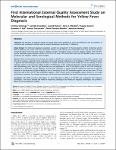First International External Quality Assessment Study on Molecular and Serological Methods for Yellow Fever Diagnosis
Domingo, Cristina
Escadafal, Camille
Rumer, Leonid
Méndez, Jairo A.
García, Paquita
Sall, Amadou A.
Teichmann, Anette
Mantke, Oliver Donoso
Niedrig, Matthias
Objective: We describe an external quality assurance (EQA) study designed to assess the efficiency and accurateness of molecular and serological methods used by expert laboratories performing YF diagnosis. Study Design: For molecular diagnosis evaluation, a panel was prepared of 14 human plasma samples containing specific RNA of different YFV strains (YFV-17D, YFV South American strain [Brazil], YFV IvoryC1999 strain), and specificity samples containing other flaviviruses and negative controls. For the serological panel, 13 human plasma samples with anti-YFVspecific antibodies against different strains of YFV (YFV-17D strain, YFV IvoryC1999 strain, and YFV Brazilian strain), as well as specificity and negative controls, were included. Results: Thirty-six laboratories from Europe, the Americas, Middle East, and Africa participated in these EQA activities. Only 16% of the analyses reported met all evaluation criteria with optimal performance. Serial dilutions of YFV-17D showed that in general the methodologies reported provided a suitable sensitivity. Failures were mainly due to the inability to detect wild-type strains or the presence of false positives. Performance in the serological diagnosis varied, mainly depending on the methodology used. Anti-YFV IgM detection was not performed in 16% of the reports using IIF or ELISA techniques, although it is preferable for the diagnosis of YFV acute infections. A good sensitivity profile was achieved in general; however, in the detection of IgM antibodies a lack of sensitivity of anti-YFV antibodies against the vaccine strain 17D was observed, and of the anti-YFV IgG antibodies against a West African strain. Neutralization assays showed a very good performance; however, the unexpected presence of false positives underlined the need of improving the running protocols. Conclusion: This EQA provides information on each laboratory’s efficacy of RT-PCR and serological YFV diagnosis techniques. The results indicate the need for improving serological and molecular diagnosis techniques and provide a follow-up of the diagnostic profiles.
Dateien zu dieser Publikation
Keine Lizenzangabe
Verwandte Publikationen
Anzeige der Publikationen mit ähnlichem Titel, Autor, Urheber und Thema.
-
2012-12-26ZeitschriftenartikelBiological and Phylogenetic Characteristics of Yellow Fever Virus Lineages from West Africa Stock, Nina K.; Laraway, Hewád; Faye, Ousmane; Diallo, Mawlouth; Niedrig, Matthias; Sall, Amadou A.The yellow fever virus (YFV), the first proven human-pathogenic virus, although isolated in 1927, is still a major public health problem, especially in West Africa where it causes outbreaks every year. Nevertheless, little ...
-
2010-11-24ZeitschriftenartikelDetection of yellow fever 17D genome in urine Domingo, Cristina; Yactayo, Sergio; Agbenu, Edinam; Demanou, Maurice; Schulz, Axel R.; Daskalow, Katjana; Niedrig, Matthias
-
2016-12-23ZeitschriftenartikelSpread of yellow fever virus outbreak in Angola and the Democratic Republic of the Congo 2015–16: a modelling study Kraemer, Moritz U. G.; Faria, Nuno R.; Jr., Robert C. Reiner; Golding, Nick; Nikolay, Birgit; Stasse, Stephanie; Johansson, Michael A.; Salje, Henrik; Faye, Ousmane; Wint, G. R. William; Niedrig, Matthias; Shearer, Freya M.; Hill, Sarah C.; Thompson, Robin N.; Bisanzio, Donal; Taveira, Nuno; Nax, Heinrich H.; Pradelski, Bary S. R.; Nsoesie, Elaine O.; Murphy, Nicholas R; Bogoch, Isaac I.; Khan, Kamran; Brownstein, John S.; Tatem, Andrew J.; Oliveira, Tulio deBackground: Since late 2015, an epidemic of yellow fever has caused more than 7334 suspected cases in Angola and the Democratic Republic of the Congo, including 393 deaths. We sought to understand the spatial spread of ...

